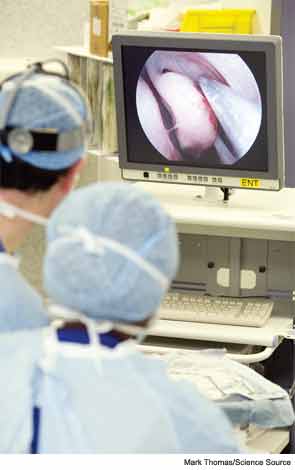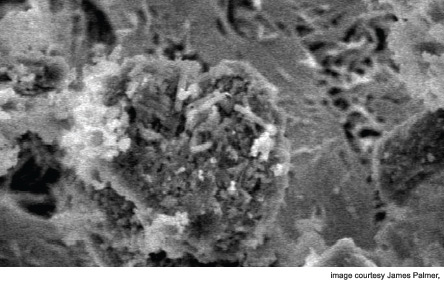What is the optimum amount of reverse Trendelenburg position to reduce bleeding without compromising surgical technique in endoscopic sinus surgery (ESS)?
CMT Does Not Improve CRS after Adequate Medical Therapy Fails
Does continued medical therapy (CMT) benefit patients with medically refractory chronic rhinosinusitis (RCRS) prior to endoscopic sinus surgery (ESS)?
Literature Review: A Roundup of Important Recent Studies
Adenotonsillectomy in obese children improves AHI but not inflammation; improvements in OSA after weight loss in obese diabetic patients even after weight regain; ESS a viable choice for children with CRS and failed therapies; otolaryngology hospitalist model can work for inpatient practices; enlarged vestibular aqueduct indicates stronger risk of hearing loss progression; patients with VFP thyroidectomy incur high cost of care

How Necessary are Postoperative Debridements After Endoscopic Sinus Surgery?
The optimal regimen is weekly debridement until normalization, or at least stabilization, of the endoscopic exam

SM13: Endoscopic Techniques Evolve As New Treatment for Sinonasal Malignancies
An endoscopic approach to sinonasal malignant tumors could eliminate the need for open facial incisions, but there are limitations to the procedures, otolargygology experts said at the Triological Society’s Combined Sections Meeting in Scottsdale, Ariz. last January

Are Routine Dissolvable Nasal Dressings Necessary Following ESS?
Nasal dressings have frequently been advocated to improve wound healing and prevent ongoing bleeding after endoscopic sinus surgery (ESS). Initial experience focused on removable nasal packing materials; however, their adverse effect profile, such as pain/discomfort and mucosal trauma, has driven the development of absorbable biomaterials. Despite these developments, there is still little agreement on the optimal choice of nasal dressing or whether nasal dressings are required at all
Correction
The article, “Conflicting Evidence on Tobacco’s Effect on ESS Outcomes” (March 2012 issue), misquoted David Kennedy, MD, professor of rhinology at the University of Pennsylvania Medical Center and Veterans Administration Hospital in Philadelphia.

Conflicting Evidence on Tobacco’s Effect on ESS Outcomes
Does smoking prevent sinus surgery from making patients feel better? Over the years, evidence and expert opinion have varied on this topic. As a result, some surgeons refuse to provide endoscopic sinus surgery (ESS) for active smokers, while others will operate because they believe surgery improves quality of life.
Concurrent Septoplasty Does Not Affect CRS-Specific Health-Related QOL
Are chronic rhinosinusitis (CRS)-specific health-related quality of life (HRQOL) outcomes affected by concurrent septoplasty performed during endoscopic sinus surgery (ESS) for medically refractory CRS? Background: Septoplasty is commonly performed during ESS. […]
Medical Management for CRS Improves QOL
In patients who have failed medical management for chronic rhinosinusitis (CRS), are there greater quality of life (QOL) outcome improvements with further medical therapy or endoscopic sinus surgery (ESS)? Background: Although […]